Aztec - a Native American group
whose
capital, Tenochtitlan,
was built on an island in a lake located where Mexico City is
now.
By the time Europeans arrived, the Aztecs ruled an empire of about five
million people. They are famous for their high level of
civilization
and crop irrigation system. An elaborate calendar governed their
civic activities and religious rituals.
The Aztec are also known for their oppressive
treatment
of neighboring tribes. Human sacrifice to their sun god was
practiced
on a staggering scale. A thousand or more captives a week were
sacrificed
in some periods. Priests cut the hearts from the living victims,
who were captured from other Indian groups.
The Aztecs and their leader, Montezuma, were
overthrown
by the Spanish under Hernando Cortes in 1521.
 Catholic
Church - the Christian church that developed in the Roman Empire
after
the death of Jesus Christ. Catholic monasteries kept learning
alive
during the Middle Ages, and the Church itself was a key force in the
political
life of European kingdoms. Catholic
Church - the Christian church that developed in the Roman Empire
after
the death of Jesus Christ. Catholic monasteries kept learning
alive
during the Middle Ages, and the Church itself was a key force in the
political
life of European kingdoms.
Catholic priests were especially active during the
Age of Discovery in the missions they started in areas of the New World
controlled by Spain and France. During the 1500s a religious
movement
in Europe called the Protestant Reformation created new churches that
opposed
some of the beliefs and practices of the Catholics. Leaders of
the new churches often argued that Christianity should be returned to a
more simple
form based solely on teachings in the Bible. They
also objected to the power of the Pope, the head of the Catholic
Church.
Over the next few centuries Catholics and Protestants
often struggled - sometimes violently - to advance their own
interpretations of Christianity. The disputes affected not only
European nations, but also the settlement and early history of
America. Fortunately, a spirit of religious tolerance grew up and
spread in the new nation, greatly reducing the old conflicts over faith.
The beliefs that evolved in the Judeo-Christian
tradition (including Jews, Catholics, and Protestants) have had an
enormous
impact on the development of the moral and political ideas of our
civilization.
For example, early Christians rejected, often at the cost of their own
lives, the power of the Roman government to demand the worship of Roman
leaders. This concept of the self, with a private consciousness
entitled
to freedom of thought and belief, is at the core of American political
beliefs
even today.
Columbian Exchange - the exchange of previously
unknown
plants
and animals between the Old World and the New World after the voyage of
Christopher Columbus in 1492. Corn and the potato came back to
Europe,
along with scores of other new plants and animals. The horse and
the cow were introduced to the New World. Disease, especially
smallpox
from Europe, was also part of the exchange.
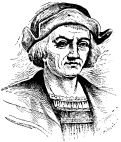 Columbus,
Christopher - the famous explorer who discovered the New World in
1492.
Born in Genoa, Italy, he was already a very experienced captain when he
conceived his plan to reach the lands of the Far East by sailing west
across
the Atlantic. After years of trying to find a backer, he finally
convinced king Ferdinand and queen Isabella of Spain to support his
voyage.
He took three ships, the Nina, Pinta, and Santa
Maria.
The exact island where he first landed in the West Indies is still
disputed. Columbus,
Christopher - the famous explorer who discovered the New World in
1492.
Born in Genoa, Italy, he was already a very experienced captain when he
conceived his plan to reach the lands of the Far East by sailing west
across
the Atlantic. After years of trying to find a backer, he finally
convinced king Ferdinand and queen Isabella of Spain to support his
voyage.
He took three ships, the Nina, Pinta, and Santa
Maria.
The exact island where he first landed in the West Indies is still
disputed.
Columbus made three more voyages to the New World,
still seeking the Far East and its fabled riches.
In recent decades, a considerable debate has emerged
about whether Columbus should be honored as a great hero of discovery,
or denounced as the first in a long line of Europeans who oppressed the
native population.
conquistadors - the Spanish word for the soldiers
and
their leaders
who conquered the Native Americans of the New World in the early
1500s.
With guns and horses, both unknown to the Indians, they had a
tremendous
military advantage. The writings of the Spanish priest Bartolome de Las
Casas revealed the terrible cruelties committed by many of the
conquistadors
against the Native Americans.
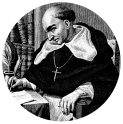 de
Las Casas, Bartolome - a Spanish soldier involved in the
conquest
of Cuba in the early 1500s who later became a priest in the Catholic
Church.
After studying the teachings of the Bible, he concluded that many of
the
activities of the Spanish in the New World were morally wrong. As
a missionary, he dedicated his life to the protection of Native
Americans.
His writings and arguments helped convince the Pope and the king of
Spain
to issue an order against the enslavement and abuse of Indians. de
Las Casas, Bartolome - a Spanish soldier involved in the
conquest
of Cuba in the early 1500s who later became a priest in the Catholic
Church.
After studying the teachings of the Bible, he concluded that many of
the
activities of the Spanish in the New World were morally wrong. As
a missionary, he dedicated his life to the protection of Native
Americans.
His writings and arguments helped convince the Pope and the king of
Spain
to issue an order against the enslavement and abuse of Indians.
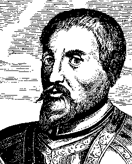 de Soto, Hernando - a Spanish explorer
who took an army
of about
600 men through much of what is now the southeast United States in
search
of gold and other riches. In 1541 he became the first European to
see the Mississippi River. De Soto overcame incredible
difficulties
along the way, but his expedition is also known for mistreatment of
many
of the Indian groups he met. He died of a fever, and only about
half
of his army survived. They never found the gold or riches they
sought,
but did strengthen Spain's claim to the Gulf Coast region from Florida
to Texas. de Soto, Hernando - a Spanish explorer
who took an army
of about
600 men through much of what is now the southeast United States in
search
of gold and other riches. In 1541 he became the first European to
see the Mississippi River. De Soto overcame incredible
difficulties
along the way, but his expedition is also known for mistreatment of
many
of the Indian groups he met. He died of a fever, and only about
half
of his army survived. They never found the gold or riches they
sought,
but did strengthen Spain's claim to the Gulf Coast region from Florida
to Texas.
exploitation - to take unfair advantage of a
person or
group
for one’s own gain, especially in an organized or systematic way.
Inca - the greatest of the New World empires,
located
along the
west coast of South America in what is now Peru. Their capital
was
at Cuzco, high in the Andes mountain range.
The Incas built thousands of miles of roads that
were used by the government to administer the empire. The civilization
was maintained without writing, which the Inca never developed.
Many
ruins of the ancient towns and buildings can still be seen, and the
stone
work is impressive.
A staple of the Inca diet was the potato, native
to the Andes. The sun god was among the sacred figures, and human
sacrifice was practiced. The Inca civilization fell to the
Spanish,
led by Francisco Pizzaro, in 1533.
Lost Colony, The - a common name for the colony at
Roanoke Island
(now in North Carolina) that was started in 1587 by the English.
Sir Walter Raleigh was among the key promoters of the venture.
The
colony is famous because all its residents disappeared, including the
first
English child born in North America, Virginia Dare.
When a supply ship came in 1590, the only signs
of the colonists’ fate were the letters CRO and the word Croatoan, the
name of a nearby island, carved on a tree trunk. The fate of the
colonists is still unknown, although archeologists hope to find a clue
someday that would solve the mystery.
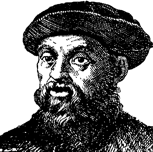 Magellan,
Ferdinand - the famous explorer from Portugal who led a Spanish
expedition
that was the first to sail around the world. Magellan and five
ships
left from Spain in 1519. Only one ship and 18 men made it home to
Spain in 1522. Magellan was killed in the Philippines in a battle
with a group of natives who were enemies of another group he
befriended.
But the voyage proved the basic layout of the continents, and helped
extend
the area claimed by the Spanish. Magellan,
Ferdinand - the famous explorer from Portugal who led a Spanish
expedition
that was the first to sail around the world. Magellan and five
ships
left from Spain in 1519. Only one ship and 18 men made it home to
Spain in 1522. Magellan was killed in the Philippines in a battle
with a group of natives who were enemies of another group he
befriended.
But the voyage proved the basic layout of the continents, and helped
extend
the area claimed by the Spanish.
missions - religious “outposts” in a foreign land
aimed
at winning
converts. In the centuries after 1492, Catholic priests from
Spain
established many mission settlements in the New World to convert Native
Americans, and teach them Europeans ways of life and agriculture.
They attempted to protect the native population from exploitation by
Spanish
conquistadors and landowners. But they have also been criticized
in modern times for the role they played in forcing Europeans ways on
Indians.
Some of the Spanish missions built in what is now California are
popular
stops for tourists.
plantation - a large farm that typically raises
one or
two large
cash crops like sugar cane or tobacco. Often, the term is
applied
to farms using forced labor, although sometimes it is applied to any
farm,
or even a settlement, such as Plymouth Plantation.
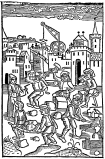 Renaissance
- in Europe, the period that lasted from about 1350 until about
1600.
The word means the “rebirth” of European civilization after the Middle
Ages. Growing trade, contact with the Arab and Chinese
civilizations,
and the rediscovery of ancient Greek and Roman books all helped trigger
the change. Renaissance
- in Europe, the period that lasted from about 1350 until about
1600.
The word means the “rebirth” of European civilization after the Middle
Ages. Growing trade, contact with the Arab and Chinese
civilizations,
and the rediscovery of ancient Greek and Roman books all helped trigger
the change.
The Age of Discovery was part of the Renaissance,
and reflects many of its characteristics. There was a new sense
of
the beauty of the natural world and the human body, and of the power of
the human mind to understand the world. There was a growing sense
that mathematics and science were the keys to discovering new
knowledge.
The magnetic compass and instruments like the
astrolabe
helped improve navigation of ships. Better maps were
developed.
The printing press, invented in the 1440s, helped spread knowledge and
curiosity about distant lands.
The growth of a new merchant class represented a
crack in the old feudal system of nobles and serfs. The merchant
class would play a big role in exploring new lands and financing
voyages
that opened up the world. In later centuries, this new middle class
would
shatter forever the absolute hold on political power held by the
nobility
and royalty of Europe.
Modern ideas of political equality and democracy
did not evolve during the Renaissance. But several Italian
city-states
adopted republican forms of government for a time. In addition,
certain
ideas found in thinkers and artists of the period, which emphasized the
capabilities of the human mind and spirit, lie at the foundation of
democratic
political theory.
smallpox - a disease common in Europe until modern
times that
caused disfiguring pustules on the skin, and sometimes death. It
killed millions of Indians in the New World when it spread from ships’
crews to the natives after 1492, because the Indians had none of the
resistance
that Europeans had built up. Today vaccines have eliminated the
disease,
but there are fears it could re-emerge in germ warfare.
Spice Islands - known today as the Molucca
Islands,
they lie
off the coasts of Asia and Australia. This small group of islands
was the main source of valuable spices like pepper in ancient
times.
Trade routes carried small amounts of the spices to Europe, where they
were highly desired by the wealthy nobility and merchant classes.
One of the key goals of early explorers was to find a sea route from
Europe
to these islands and other lands of the Far East.
|